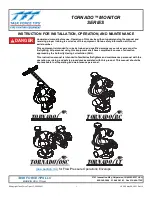
Chapter 1 - Getting started - 15
3. Before powering the system, check the power cables and the plugs. Damaged
electrical parts must be replaced immediately by authorised personnel.
4. Large gas cylinders, which may be given by the manufacturer or purchased by the
customer, should be secured with cylinder safety chains or safety stands.
5. When removing the protective cap, inspect the cylinder valve for damaged threads,
dirt, oil or grease. Remove any dust or dirt with a clean cloth. If oil or grease is
present on the valve of a cylinder which contains oxygen, do not attempt to use.
Such combustible substances in contact with oxygen are explosive.
6. Be certain that the materials of the pressure regulators are chemically compatible
with the intended gas service before installation. Inspect the regulator for the proper
connection and note the ranges of the pressure gauges. Also examine the physical
condition of the regulator including threads and fittings. Remove any dust or dirt
from the regulator or cylinder valve with a clean cloth. Do not install a regulator on
a cylinder valve containing oxygen if grease or oil is present on either. Such
substances in contact with oxygen are explosive.
7. Cleaning residue, particulates, and other contaminates (including pieces of torn or
broken components) in the breathing circuit pose a safety risk to the patient during
testing procedures. Aspiration of contaminates can potentially be life-threatening.
Use disposable anti-bacterial filters or disinfect each part in contact with the patient
before each test.
8. You must follow all the cleaning procedures in System Maintenance, and you must
thoroughly inspect the components after cleaning and before each patient test.
9. This device is not suitable for use in presence of flammable anaesthetics. It is not
an AP nor an APG device (according to the EN 60 601-1 definitions).
10. Keep the device away from heat and flame source, flammable or inflammable
liquids or gases and explosive atmospheres.
11. In accordance with their intended use K4 b
2
is not to be handled together with other
medical devices unless it is clearly declared by the manufacturer itself.
12. It is recommended to use a computer with electromagnetic compatibility CE
marking and with low radiation emission displays.
13. It is necessary to make the PC, connected to the
K4 b
2
, compliant with EN 60601-1
by means of an isolation transformer.
14. Graphical symbols used in accordance to present specifications are described here
below:
Equipment type B (EN60601-1)
Equipment type BF (EN60601-1)
Danger: high temperature
OFF
ON
Protective earth ground
Alternating current
Summary of Contents for K4B2
Page 12: ...12 K4 b 2 User Manual...
Page 13: ...Getting started...
Page 27: ...Measurements...
Page 31: ...Installation...
Page 42: ...42 K4 b 2 User Manual...
















































